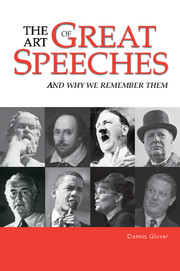Book contents
- Frontmatter
- Contents
- Speeches
- Photographs
- Acknowledgements
- Introduction
- Chapter 1 To save a republic
- Chapter 2 Speech – the essence of democracy
- Chapter 3 Forum
- Chapter 4 Style
- Chapter 5 Emotion
- Chapter 6 Character
- Chapter 7 Evidence
- Chapter 8 Morality
- Chapter 9 Gettysburg
- Chapter 10 Speechwriter
- Conclusion: The ideal orator
- Appendix Common figures and terms
- Notes
- Index
- Frontmatter
- Contents
- Speeches
- Photographs
- Acknowledgements
- Introduction
- Chapter 1 To save a republic
- Chapter 2 Speech – the essence of democracy
- Chapter 3 Forum
- Chapter 4 Style
- Chapter 5 Emotion
- Chapter 6 Character
- Chapter 7 Evidence
- Chapter 8 Morality
- Chapter 9 Gettysburg
- Chapter 10 Speechwriter
- Conclusion: The ideal orator
- Appendix Common figures and terms
- Notes
- Index
Summary
Near the conclusion of his dramatic speech over Caesar's body, Shakespeare's Antony delivers these intriguing lines:
I am no orator, as Brutus is;
But, as you know me all, a plain blunt man,
That love my friend…
Why such modesty and praise for the competition? You wouldn't want it from your surgeon mid-incision: ‘That other surgeon – the one your health fund wouldn't pay for – he's far more skilled than I am.’ Cicero knew:
Propeterea quod prudentia hominibus grata est, lingua suspecta.
The reason is that practical knowledge is pleasing to men, but a clever tongue is suspect.
Fine oratory, we fear, is a trick to overwhelm the listener's reason and camouflage poor logic and weak evidence. But it works. In fact, denying eloquence is part of the trick, and those who deny eloquence loudest are often those who employ it most effectively.
So just how ‘plain’ and ‘blunt’ was Antony’?
The earliest rhetoricians understood that the brain had its own ways of arranging speech to make it more appealing to the mind, tongue and ear – punctuation divided speech into clauses, sentences and paragraphs to separate out ideas and coordinate reading and breathing. They also realised that the way words were used and arranged in speech could alter their meaning and force. The genius of Aristotle, Cicero and Quintilian developed these insights into a system of technical classification that helps us understand why politicians speak the way they do. Some of their terms are still in common usage, such as euphemism, hyper- bole, climax, anticlimax, alliteration and sarcasm. But while we may no longer be taught any other of these classifications by name (as Shakespeare was), we are all familiar with their effects. It’s what we mean when we recognise that someone is speaking figuratively.
- Type
- Chapter
- Information
- The Art of Great SpeechesAnd Why We Remember Them, pp. 90 - 123Publisher: Cambridge University PressPrint publication year: 2010



